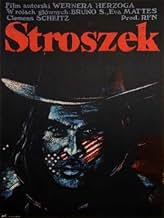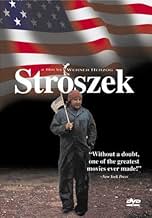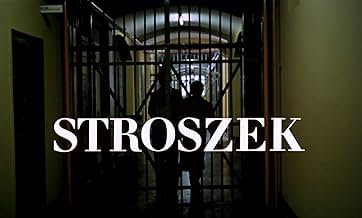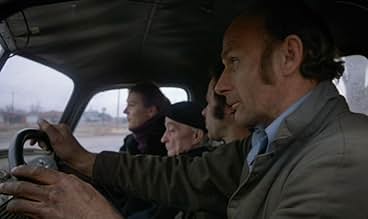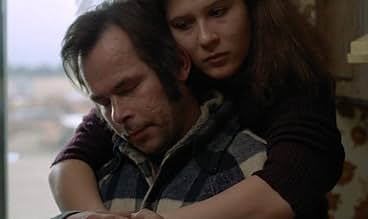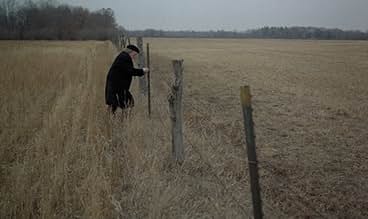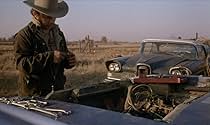In Berlin, an alcoholic man, recently released from prison, joins his elderly friend and a prostitute in a determined dream to leave Germany and seek a better life in Wisconsin.In Berlin, an alcoholic man, recently released from prison, joins his elderly friend and a prostitute in a determined dream to leave Germany and seek a better life in Wisconsin.In Berlin, an alcoholic man, recently released from prison, joins his elderly friend and a prostitute in a determined dream to leave Germany and seek a better life in Wisconsin.
- Awards
- 2 wins & 2 nominations total
- Scott
- (as Scott Mc Kain)
- Doctor
- (as Dr. Vaclav Vojta)
- Turk prisoner
- (as Yücsel Topcugürler)
- Trucker Pimp
- (uncredited)
- Director
- Writer
- All cast & crew
- Production, box office & more at IMDbPro
Featured reviews
This intensely moving and satisfying film which begins in Germany and winds up in Wisconsin is solid through and through. There's not a weak moment or weak element to be found. The acting, especially by Bruno S., is completely unaffected and without over-stylization (there is, perhaps, a reason for this - they aren't acting, simply being). The story itself deals with melodramatic elements without steering into soap opera territory and the film's ideology is not black in white. There's subtlety and complexity to the ideas put forth in this film about America, Germany, human beings, life, etc. Moreover, Stroszek avoids beating the audience's brains with its ideas; Herzog presents them in the context of the story, smoothly integrated.
And then there's the beautiful photography, particularly of the American Midwest; Herzog and his cameramen capture perfectly the cold, stark, desolate magnificence of the upper-Plains. To draw a weird comparison, the photography here is the equivalent of Husker Du's New Day Rising - crisp, harsh, and gorgeous simultaneously.
Stroszek also has a justifiably well-known ending, both surreal and completely sensible. Though any other director would be unable to top an ending such as that in Aguirre (the slumped conqueror, floating on a monkey-covered raft), Herzog does just that here.
Truly, if you have not seen any Herzog, this is a great place to start; then go see Aguirre, Fitzcarraldo, Nosferatu, Woyczek, and Invincible. The man is brilliant and I await with bated breath Grizzly Man, his new project.
"Stroszek" tells the fictional story of a real man named Bruno Stroszek. In other words, Stroszek plays himself in this eccentric film about a man who's released from prison, meets back up with his girlfriend and elderly buddy, and takes off for the fabled lands of....Wisconsin....to pursue the American dream. Anyone who's actually been to Wisconsin can probably guess how things play out for three immigrants with about three dollars between them. What follows is a series of vignettes that place Bruno in increasingly desperate straits and ends in an ambiguous finale that involves a ski lift and dancing chickens.
Welcome to the world of Werner Herzog, folks. "Stroszek" is not as compelling as some of Herzog's best, but it does inspire a sort of morbid fascination, if only because we take comfort that our situation isn't as bad as the one our characters find themselves in. But lest you are tempted to feel too sorry for Stroszek, he, like many of Herzog's protagonists, staunchly refuses to beg for sympathy, and faces one hardship after another with the dogged determination of a man who never fully understands how humble is his lot.
Grade: A-
The film handles the story of former asylum inmate Bruno S. (THE ENIGMA OF KASPAR HAUSER) as a Berlin street singer (in a role where he basically plays himself), who joins with his prostitute girlfriend Eva (Eva Mattes) and ageing eccentric friend Scheitz (Clemens Scheitz) to embark on a memorable journey, leaving modern Berlin, for the golden opportunities of America. The 'promised land' is represented by the dreary, austere town of Railroad Flats in rural Wisconsin, where they settle in a mobile home bought on credit, but it turns out America is not gonna fulfill their dreams that easily.
Shot in winter, Berlin is shown as a cold, forbidden and lacklustre place. Not a ray of sunshine. The dark facades of the battered apartment blocks, downlit bars filled with smoke and shabby characters, the only goal the folks in Bruno's world seem to have, is merely make the best of things.
Often read as a critique of how capitalist American society destroys the individual, Herzog sees the film as less a critique of the United States than as "a eulogy" in the wake of the American dream, for such shattered hopes could develop in virtually any country (see "Herzog on Herzog", p. 144). He does throw in some of the eccentricities of American life, but above all, it's a somewhat surreal account of three simple folks, short-changed in life, desperately trying to make ends meet. From the start it's clear that these three are made for each other. They simply do not fit in any stratum of society really. They're too fragile for the world of pimps and low lives that formed the background of their lives in Berlin. Although not dumb, Bruno is too half-witted to be taken seriously by most people. Eva's background is not fully explained, but she's emotionally fragile and dependent, while elderly Scheitz's chances to get ahead in life seems to lay in the past.
It's a bleak and uncompromising film, this tragicomic account of this odd trio in pursuit of a better life outside the dreary confinements of Berlin's lower casts of society, but it's so intensely moving and honest with its subjects, that alone is something to admire.
Camera Obscura --- 9/10
The running commentary that Herzog has recorded for the recent DVDs of his films are among the most interesting and engaging I've heard, and they're one of the reasons I especially appreciate the DVD medium. That's not to say that he lets the literal-minded viewer off the hook by providing handy explanations for every peculiar image or bit of dialog. When asked what a certain image or phrase signifies, he will sometimes simply say that he cannot explain it. But I find it fascinating to watch a scene, and then scan back and listen to his comments about the location, actors, technical details, and yes, even sometimes the intended effect of a puzzling image. Many of the people seen in his films are non-actors, people he simply ran into, found interesting, and intuitively knew would be effective on film. Some of the players in Herzog's films are the very people that most directors would chase from their set with security guards, but he sees something interesting in them, and finds a way to tap into it. I can't help liking the man for that. Some people have suggested that his use of the unfortunate Bruno S. as a film actor amounted to some sort of exploitation. But it seems to me that his befriending of Bruno, and his artful and patient use of him as a film actor, must have given Bruno some sense of the dignity and worth as a unique human being that was denied him for most of his life. If this means nothing to you, and you don't know anything about Bruno S., the commentary tracks on either "Stroszek" or "The Enigma of Kaspar Hauser" explain his background nicely. It's a remarkable story.
If you're unfamiliar with Herzog's work, he has done some especially exotic films with the volatile actor Klaus Kinski. "Cobra Verde" is a particular favorite of mine. But his films do not have the relentless pace or hyperactive editing typical of mainstream American films. They are unforgiving of those with short attention-spans, so be forewarned.
Did you know
- TriviaThe entire crew disliked the last sequence so much that director Werner Herzog had to shoot it by himself. Incidentally, he considers this scene the best he has filmed.
- GoofsAfter Bruno, Eva and Scheitz buy a used car, they drive out to Wisconsin. The camera's shadow is visible on the car as Eva drives.
- Quotes
[last lines]
Deputy Sheriff: We have a 10-80 out here, a truck on fire, we have a man on the lift. We are unable to find the switch to turn the lift off, can't stop the dancing chickens. Send an electrician, we're standing by.
- SoundtracksOn the Way Down to Phoenix
Written and Performed by Chet Atkins
- How long is Stroszek?Powered by Alexa
Details
- Release date
- Country of origin
- Languages
- Also known as
- Stroszek
- Filming locations
- Plainfield, Wisconsin, USA(hold up on North Street)
- Production companies
- See more company credits at IMDbPro
Box office
- Gross worldwide
- $3,451

